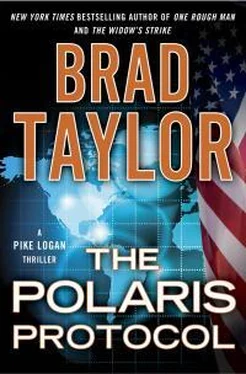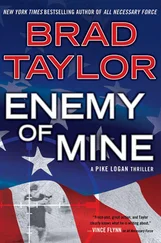“I’m being blamed for it! I have to travel to Matamoros to explain to the capo why I attacked them, and I had nothing to do with it. Sinaloa is going on war footing, and Los Zetas are not pleased. Someone is trying to get me out. That’s the only explanation. Someone who knows Juárez.”
Someone like me, thought the sicario.
“Do you wish me to go to Juárez? Attempt to find out what happened and punish those responsible?”
El Comandante rubbed his face. “No. Take the journalist to the airport again today. I’d like to report some good news when I leave. Find the man coming from America and find out what he has that Sinaloa wants.”
The sicario could read between the lines clearly enough. El Comandante no longer trusted him and wanted him close. He believed the sicario was involved in this ludicrous attack and feared what he would do once in Juárez.
He said, “If the man doesn’t show today, what do you want me to do?”
“Kill the journalist. Dump him in the desert, then return back here. You will be coming to Matamoros with me.”
As an offering to the capo. The sicario betrayed nothing on his face, simply saying, “It will be done.”
He entered the basement, seeing their new captive cowering in the corner, afraid to even meet his eyes. A young man, most likely from a rich family. The sicario was probably the foremost expert on the mechanics of kidnapping that Los Zetas had, but he’d never done it for money, like Los Zetas were known for in Mexico City. In Juárez, he did it for one thing, and no amount of money would alter his captive’s fate.
He waved the journalist to his feet, feeling the irony of his work in Juárez. He had been tempted multiple times with huge amounts of cash but had always remained loyal to Los Zetas. Always executing exactly what the jefe wished, condemning his soul to hell in the process. Walking back up the stairs with the journalist in tow, he wondered if that loyalty would now be his death.
*
They had been on the road for close to thirty minutes, the sicario aggravated at the antics of the cars around him. Yesterday, the drive had been novel, not the least because he was operating a brand-new BMW 5 Series instead of the usual clunker that blended in around Juárez and allowed him to work his deadly skills. In Juárez a car like this would have been as bad as driving a fire truck with the lights spinning, but here it had been a diversion from the traffic. Now, the satellite radio, heads-up display, and other electrical wizardry no longer held his interest, and the idiots in the vehicles around him began to grate.
With thoughts of his meeting with El Comandante swirling in his head, he uttered his first words to the journalist that weren’t a command.
“Tell me, what is it like in the United States. Is it like here?”
He heard nothing and glanced at the journalist in the passenger seat. The man sputtered for a moment, then said, “I … I don’t know what you mean.”
The sicario said, “Do you live in fear? Do people in your cities fear men like me?”
At first the journalist said, “Yes,” followed by a pause, then, “Well, no, that’s not true. There is no one like you in America. At least not in my world. The only people that run into men like you are criminals. If you do nothing wrong, you don’t have anything to fear. Unlike here.”
The sicario pondered the statement, wondering how the journalist could believe such a thing. Surely his world and the journalist’s were not so removed from each other.
He said, “Life is nothing but a series of interconnected events. There is no right and wrong, only moving forward, making the best of each circumstance. Good and bad is a myth to explain away things, nothing more.”
When the journalist didn’t reply, he said, “Do you agree?”
He could tell the man was working up his courage. He smiled and said, “There is no right or wrong answer, either.”
Finally, the journalist said, “No. I don’t agree. We create our own destiny by the path we choose. Right and wrong do matter.”
“So you’ve done something wrong on your path of life, and it led you to me. You deserve this?”
The journalist’s eyes widened. “No! I’ve done nothing bad. I don’t deserve to be here.”
The sicario stared at him for a moment, causing the journalist to turn away. He said, “And yet here you sit, next to me. A killer working for men who you would say have done only bad. How did right and wrong matter on your path, then?”
The journalist said nothing, and the sicario was disappointed. He had hoped to glean some truth he had missed in his life. Hoped to learn a secret from another world he had yet to experience.
They rode in silence for a few minutes. Then the journalist surprised him by asking, “Do you have a family?”
“I did, but they’re dead now.”
The journalist paused, then said, “May I ask how they died?”
“In a war. They were killed in a raid.”
“And you don’t think that’s wrong? When it happened, did you feel it was justice?”
The images of the campesinos fleeing from his machete flashed in his mind, and he shunted them aside. The day before that attack, he had been told of the death of his mother and sister at the hands of the rebels, and his rage had flowed through the peasant village in retaliation. The campesinos were long dead, but their ghosts punished him still.
He said, “When I was a child we had a coop of chickens. It was our livelihood, with my mother bartering the eggs for other things. One day, I went to feed them and found all of them slaughtered. A fox had come in the night and had killed every single one. He didn’t eat them. Just killed them. He had taken our livelihood. Was the fox evil?”
The journalist said, “You can’t compare a chicken coop to human beings. The fox is an animal. He doesn’t know the difference between right and wrong.”
The sicario pulled into the parking area for terminal one and said, “Or there is no right and wrong. Only interconnected events.” He turned off the car and said, “Do you see? Or do you have a different explanation for your fate?”
The journalist seemed to withdraw into himself, disappointing the sicario yet again. He wanted a new truth. A new reason for what had happened in his life. Instead, it looked like he was instilling a new reality into the journalist. The one true reality.
They entered the terminal, and, like before, the sicario muscled his way to the front, his slight frame not nearly as powerful in exacting compliance as his gaze. He positioned the journalist and began to wait, sure he would end up killing the man in another couple of hours, and was a little sad at the prospect. He would have liked to talk again. Explore the differences in their lives a little more.
Forty-five minutes in, growing more positive the journalist would be sacrificed, he was beginning to construct a plan for disposal of the body when he saw the man visibly start. Thinking he had spotted the courier, he followed the journalist’s gaze, then did a double take before his eyes reached the doors exiting customs, having a flash of recognition of a man on his side of the ropes.
Carlos.
He studied the face to be sure, then backed away. It was Carlos. A respected member of the Sinaloa cartel’s operations in Juárez, he had been marked for capture by Los Zetas numerous times but had always escaped either through luck or through a change in focus of El Comandante. The sicario had studied his life intently, learning his patterns and methods, and had nicknamed him El Traje because of his habit of always wearing a business suit, like he did today.
Why is he here? El Comandante had said the leadership had been killed. Decimated in a military-type attack.
Читать дальше












